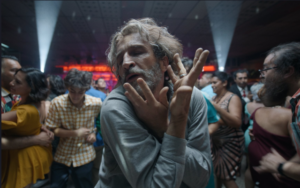BARDO, FALSE CHRONICLE OF A HANDFUL OF TRUTHS: 2 ½ STARS. “existential crisis.”
 “Bardo, False Chronicle of a Handful of Truths,” the new Netflix film from Alejandro González Iñárritu, Oscar winning director of “The Revenant” and “Birdman or (The Unexpected Virtue of Ignorance), is for people who didn’t think Bob Fosse’s “All That Jazz” was self-indulgent enough.
“Bardo, False Chronicle of a Handful of Truths,” the new Netflix film from Alejandro González Iñárritu, Oscar winning director of “The Revenant” and “Birdman or (The Unexpected Virtue of Ignorance), is for people who didn’t think Bob Fosse’s “All That Jazz” was self-indulgent enough.
A surreal treatise on the search for purpose in life, “Bardo”—a Buddhist name for the transitional state between death and rebirth—is cut loose of reality, existing in a world where a newborn baby can whisper a request to stay in his mother’s womb because the world is too messed up.
Living in this whimsical world is Silverio (Daniel Giménez Cacho), a journalist-turned-documentary-filmmaker just days away from becoming the first Mexican to be awarded a prestigious American journalism accolade. Instead of elation, Silverio develops a bad case of imposter’s syndrome. He anxiously questions everything, from his professional success and Mexican identity, to family trauma and the biggest question of all, what, exactly are we doing here? “Success,” he says, “has been my biggest failure.”
He spends the movie gazing into what seems to be a never-ending navel, one filled with existential crisis and vivid fever dreams.
There are undeniably unforgettable images contained in Iñárritu’s ethereal, dreamlike film. A conversation with conquistador Hernán Cortés, at the top of a pyramid of corpses will sear itself into your corneas and the opening shot, of Silverio’s shadow leapfrogging through a desert, is beautiful and haunting. But as memorable as these sequences are, they feel as if Iñárritu is flexing a muscle, pumping the movie up with beefy visuals that exist simply for the sake of filling the screen, not filling out the storytelling.
The hallucinatory visuals often overwhelm the points Iñárritu attempts to elucidate. He is a master of cinematographic language, but the mix and match of Silverio’s rambling search for meaning with these flamboyant images, adds up to a showy, self-referential film, one that is too much enamoured with itself.
Amusingly, Iñárritu seems to understand this. In one long scene a former friend turned television provocateur taunts Silverio, accusing him of being shallow and pretentious. It’s a meta moment, one in which the film’s characters accurately sum up the action happening around them onscreen. It is the most self-aware moment in “Bardo,” a movie that attempts to unearth life’s deeper meaning, but often is too obtuse to move the heart or the spirit.
